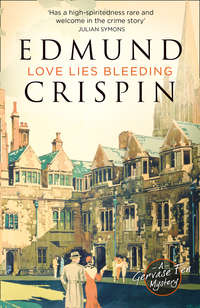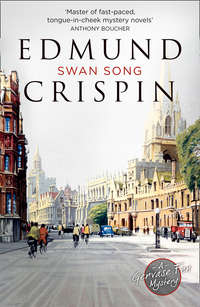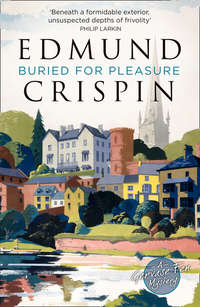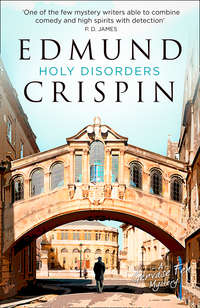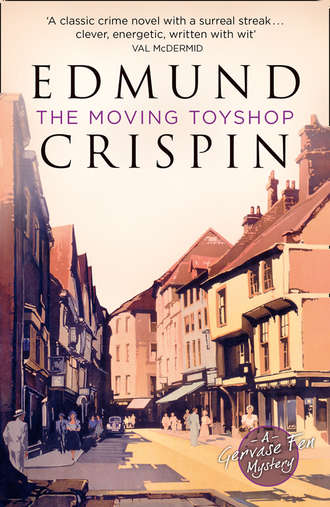
Полная версия
The Moving Toyshop
‘My dear fellow, calm yourself,’ said Fen, taking the scrap of paper from him. ‘Anyway, what is this thing tangible proof of?’ He read out the pencilled figures. ‘07691. A telephone number, apparently.’
‘Probably the number of the woman who was killed.’
‘Dear good Richard, what an extraordinary lack of perceptivity…One doesn’t carry one’s own telephone number about with one.’
‘She may have written it down for someone. Or it may not have been hers.’
‘No.’ Fen ruminated over the scrap of paper. ‘Since you seem to be forgetting rather a lot of things, I suppose you didn’t come across her handbag and look inside it?’
‘I’m certain it wasn’t there. Obviously, it’s the first thing I should have done.’
‘One never knows with poets.’ Fen sighed deeply and returned to the desk. ‘Well, there’s only one thing to be done with this number, and that is to ring it.’ He took off the receiver, dialled 07691, and waited. After a while there was an answer.
‘Hello.’ A rather tremulous woman’s voice.
‘Hello, Miss Scott,’ said Fen cheerfully. ‘How are you? Have you been long back from Baluchistan?’
Cadogan gazed at him blankly.
‘I’m sorry,’ said the voice. ‘But I’m not Miss Scott.’
‘Oh.’ Fen gazed at the instrument in great dismay, as though he were expecting it to fall apart at any instant. ‘Who is that speaking, please?’
‘This is Mrs Wheatley. I’m afraid you have the wrong number.’
‘Why, so I have. Very stupid of me. I’m sorry to have bothered you. Good-bye.’ Fen seized the telephone directory and flipped over the pages.
‘Wheatley,’ he murmured. ‘Wheatley…Ah, here it is. Wheatley, Mrs J. H., 229 New Inn Hall Street, Oxford 07691. The lady seemed to be in very good health. And I suppose you realize, my dear Cadogan, that it might be any one of a thousand exchanges besides this?’
Cadogan nodded wearily. ‘Yes, I know,’ he said. ‘It’s hopeless, really.’
‘Look here, did you go round to the back of the shop with the police? The way you got out?’
‘Actually, no.’
‘Well, we’ll do that now. I want to have a look at the place, anyway.’ Fen considered. ‘I’ve got a tutorial at ten, but that can be put off.’ He scribbled a message on the back of an envelope and propped it up on the mantelpiece. ‘Come on,’ he said. ‘We’ll drive.’
They drove. Driving with Fen was no pleasure to a man in Cadogan’s condition. It was all right in St Giles’ because St Giles’ is an immensely broad street where it is quite difficult to hit anything, except for the pedestrians who constantly scuttle across its expanses like startled hens, in a frantic and perilous gauntlet race. But they nearly smashed into a tradesman’s van in Broad Street, despite its width, they tore across the traffic lights by the King’s Arms just as they were changing, and they traversed Holywell Street and Long Wall Street in rather under a minute. Their eventual emergence into the thronged High Street Richard Cadogan describes as being by far the most horrifying episode of his entire adventure, for Fen was not the man to wait for anyone or anything. Cadogan stopped his eyes and ears and tried to meditate on the eternal verities. Yet somehow they did it, and were across Magdalen Bridge, and for the third time that morning he found himself in the Iffley Road.
Fen brought Lily Christine III to a shuddering standstill some way away from the location of the phantom toyshop.
‘You’ve been here before,’ he pointed out. ‘Someone might recognize you.’ The car backfired. ‘I wish it wouldn’t do that…I’m going to spy out the land. Wait till I come back.’ He climbed out.
‘All right,’ said Cadogan. ‘You’ll find it quite easily. Just opposite that church.’
‘When I get back, we’ll go round behind the shop.’ Fen strode off with his customary vigour.
The morning shopping rush had not yet begun, and the establishment of Winkworth, Family Grocer and Provisioner, was empty except for the grocer himself, a fat man swathed in priestly white, with a rotund and jolly face. Fen entered with a good deal of noise, observing, however, that the door did not squeak.
‘Good morning, sir,’ said the grocer amiably, ‘and what can I do for you?’
‘Oh,’ said Fen, who was looking curiously about him, ‘I want a pound of’ – he cast about in his mind for something suitable – ‘of sardines.’
Manifestly the grocer was somewhat taken aback. ‘I’m afraid we don’t sell them by weight, sir.’
‘A tin of rice, then.’ Fen frowned accusingly.
‘I beg your pardon, sir?’
‘Are you Mr Winkworth?’ Fen hastily dismissed the subject of purchases.
‘Why, no, sir. I’m only the manager here. It’s Miss Winkworth as owns the shop – Miss Alice Winkworth.’
‘Oh. May I see her?’
‘I’m afraid she’s away from Oxford at the moment.’
‘Oh. Does she live above here, then?’
‘No, sir.’ The man looked at him oddly. ‘No one lives above here. And now, about your purchases—’
‘I think I’ll leave them till later,’ said Fen blandly. ‘Much later,’ he added.
‘I shall be at your service any time, sir,’ the grocer answered magniloquently.
‘A pity’ – Fen watched the man closely – ‘a pity you don’t sell toys.’
‘Toys!’ the grocer ejaculated, and it was obvious that his astonishment was genuine. ‘Well, sir, it’s hardly likely you’d find toys in a grocer’s shop, is it?’
‘No, it isn’t, is it?’ said Fen cheerfully. ‘Nor dead bodies either. Good morning to you.’ He went out.
‘It’s no good,’ he told Cadogan, who was sitting in Lily Christine III, trying to adjust his bandage and staring in front of him. ‘I’m convinced that man knows nothing about it. Though he did behave rather queerly when I asked about the owner of the shop. A Miss Alice Winkworth, apparently.’
Cadogan grunted ambiguously at this information. ‘Well, let’s go round to the back, if you think it will do any good.’ His tone indicated little confidence in this prospect.
‘And by the way,’ Fen added as they walked down the narrow, sloping alleyway which led to the back of the shops, ‘was there anyone about when you came with the police this morning?’
‘In the shop, you mean? No, no one. The police let themselves in with skeleton keys, or something. The door was locked by then.’
They counted the creosoted wooden fences which marked off the little garden.
‘This is it,’ said Cadogan.
‘And someone’s been sick here,’ said Fen with distaste.
‘Yes, that was me.’ Cadogan peered in at the gate. The neglected overgrown enclosure, which had seemed so sinister in the half-light, looked quite ordinary now.
‘You see that small window?’ he said. ‘To the right of the front door? That’s the sort of closet place I got out of.’
‘Is it, now?’ Fen answered thoughtfully. ‘Let’s go and have a look at it.’
The small window was still open, but it was higher from the ground than Cadogan had remembered, and even Fen, tall as he was, could not see inside. Somewhat disappointed they went on to the back door.
‘This is open, anyway,’ said Fen. Cadogan banged against a dustbin which stood beside it. ‘For goodness’ sake try to avoid making that terrible noise.’
He moved inside with some caution, and Cadogan followed him. He was not very clear what they were supposed to be doing. There was a short corridor, with a kind of kitchen, untenanted, on the left, and the door of the closet, half open, on the right. From the shop in front came the murmur of voices and the bell of the cash register.
But the closet contained cleaning things no longer. There were, instead, piles of groceries and provisions. And Cadogan was seized by a sudden doubt. Was the whole thing, after all, a delusion? Surely it was all too fantastic to be real? After all, it wasn’t impossible that he should have fallen on his way into Oxford, struck his head, and dreamed the entire business – its quality was nightmarish enough. He blinked about him. He listened. And then, in some alarm, he tugged Fen by the sleeve.
There was no doubt about it. Footsteps were approaching the closet.
Fen did not hesitate a moment. ‘Every man for himself,’ he said, leaped on to a pile of boxes and projected himself feet first out of the window. Unfortunately in so doing he knocked over the boxes with a great clatter, and thus cut off Cadogan’s line of retreat. There was no time to pile them up again, and the back door was out of the question – the handle of the closet was already turning. Cadogan seized a tin of baked beans in his right hand, and one of kidney pudding in his left, and waited, adopting a forbidding aspect.
Fatly expectant, the grocer entered his closet. His eyes bulged and his mouth gaped in stupefaction when he saw the intruder, but to Cadogan’s surprise he made no aggressive movements. Instead, he raised both hands above his head, like an Imam invoking Allah, called out ‘Thieves! Thieves! Thieves!’ in a loud theatrical voice, and fled away as fast as his bulk would allow. Evidently he was much more afraid of Cadogan than Cadogan was of him.
But Cadogan did not stop to think of these things. The back door, the neglected garden, the gate, and the alleyway marked the stages of his frantic retreat. Fen was sitting in Lily Christine III, reading The Times with elaborate concentration, and a small, vaguely interested crowd had gathered round the front of the shop to listen to the grocer’s continued cries. Cadogan scuttled across the pavement and into the back of the car, where he lay down on the floor. With a jerk they started.
Once over Magdalen Bridge, he sat up and said ‘Well?’ with some bitterness.
‘Sauve qui peut,’ said Fen airily – or as airily as was possible above the outrageous din of the engine. ‘And remember, I have a reputation to keep up. Was it the grocer?’
‘Yes.’
‘Did you cosh him one?’
‘No, he ran away in a fright…Well, I’m damned,’ said Cadogan, staring. ‘I’ve brought a couple of tins away with me.’
‘Well, we’ll have them for lunch. That is, if you’re not arrested for petty larceny before then. Did he get a look at you?’
‘Yes…I say, Gervase.’
‘Well?’
‘I want to get to the bottom of this business. My blood’s up. Let’s go and see this Wheatley woman.’
So they drove to New Inn Hall Street.
3
The Episode of the Candid Solicitor
Two hundred and twenty-nine, New Inn Hall Street proved to be a modest and attractive lodging-house almost next door to a girls’ school; and its proprietress, Mrs Wheatley, a small, timid, bustling, elderly woman who twisted her apron nervously in her hands while she talked.
‘I’ll deal with this,’ Cadogan had said to Fen when they arrived. ‘I have a plan.’ In point of fact, he had no plan of any kind. Fen had agreed to this, rather grudgingly. He had then settled down to do the Times crossword puzzle, filling in the literary clues without difficulty. But the rest eluded him, so he sat looking crossly at the passers-by.
When Mrs Wheatley opened the door to him, Cadogan was still trying to think what to say.
‘I expect,’ she said anxiously, ‘that you’re the gentleman about the Rooms.’
‘Exactly.’ He was greatly relieved. ‘The Rooms.’
She showed him inside.
‘Very nice weather we’re having,’ she said, as though personally responsible for this phenomenon. ‘This would be the sitting-room.’
‘Mrs Wheatley, I’m afraid I’ve deceived you.’ Now he was inside the house, Cadogan decided to abandon his stratagem. ‘I’m not about the Rooms at all. The fact is’ – he cleared his throat – ‘have you a friend or relation, an elderly lady, unmarried, with grey hair and – er – given to wearing tweeds and blouses…?’
Mrs Wheatley’s pinched, anxious face lit up. ‘You don’t mean Miss Tardy, sir?’
‘Er – what was the name again?’
‘Miss Tardy, sir. Emilia Tardy. “Better Late than Never” we used to call her. On account of the name, you see. Why, Emilia’s my oldest friend.’ Her face clouded. ‘Nothing’s wrong, is it, sir? Nothing’s happened to her?’
‘No, no,’ Cadogan said hastily. ‘Only I met your – ah –friend some time ago, and she said that if ever I was in Oxford I was to be sure to look you up. Unfortunately, I never quite caught her name, though I remembered yours.’
‘Why, that’s right sir.’ Mrs Wheatley beamed. ‘And I’m very glad you’ve come – very glad indeed. Any friend of Emilia’s is welcome here. If you’d like to just come down to my sitting-room and take a cup of tea, I could show you a photograph of her to refresh your memory.’
This was luck, Cadogan reflected as he followed Mrs Wheatley to the basement; for he had little doubt that Emilia Tardy and the woman he had seen in the toyshop were one and the same. The sitting-room turned out to be cluttered up with wicker chairs, budgerigars, flower calendars, reproductions of Landseer, and unattractive plates depicting unstable Chinese bridges. There was an enormous stove along one side, with a kettle simmering on it.
The confusions attendant upon the brewing of tea over, Mrs Wheatley hastened to a drawer and reverently brought forth a rather faded brown photograph.
‘Here she is, sir. Now, was that the lady you met?’
Unquestionably it was, though the photograph must have been ten years old, and the face he had seen had been swollen and discoloured. Miss Tardy smiled kindly and vaguely at the photographer, her pince-nez balanced on her nose, her straight hair a little deranged. But it was not the face of an ineffectual spinster; there was a certain self-reliance in it, despite the vague smile.
He nodded. ‘Yes, this is she.’
‘Might I ask if it was in England you met her, sir?’ Looking over his shoulder, Mrs Wheatley timidly twisted her blue apron in her hands.
‘No, abroad.’ (From the form of the question, a safe bet.) ‘And quite a long time ago now – six months at least, I should think.’
‘Ah, yes. That would be when she was last in France. A great traveller, Emilia is, and how she has the courage to live among all those foreigners is beyond me. You’ll pardon my curiosity, sir, but it’s four weeks since I heard from her, and that’s rather strange, as she’s always been a most faithful writer. I’m afraid something may have happened to her.’
‘Well, I’m sorry to say I can’t help you there.’ As he sipped his tea and smoked his cigarette in that cheerful, ugly room, under the anxious eyes of little Mrs Wheatley, Cadogan felt a slight dislike for his presence. But no purpose would be served by brutally telling his hostess of the facts of the case, even if he had really known what they were.
‘She travelled – travels – a lot, then?’ he asked in the tautologous fashion of modern conversation.
‘Oh, yes, sir. Small places mostly, in France and Belgium and Germany. Sometimes she only stops a day or so, sometimes months on end, according to how she likes it. Why, it must be three years if it’s a day since she was last in England.’
‘A rather unsettled sort of existence, I should have thought. Has she no relatives? She did strike me as being rather a lonely sort of person, I must say.’
‘I think there was only an aunt, sir…Let me give you another drop of tea in your cup. There…And she died some time ago. A Miss Snaith she was, very rich and eccentric, and lived on Boar’s Hill, and had a liking for comic poems. But as to Emilia, she enjoys travelling, you know; it suits her. She’s got a little bit of money of her own, and what she doesn’t spend on the children, she spends on seeing new places and people.’
‘The children?’
‘Devoted to children, she is. Gives money to hospitals and homes for them. And a very nice thing to do, I say. But if I may ask, sir, how was she looking when you saw her?’
‘Not too well, I thought. I didn’t really see much of her. We were thrown together for a couple of days in a hotel – the only English people there, you know, so naturally we chatted a bit.’ (Cadogan was appalled at his fluency. But didn’t Mencken say somewhere that poetry is only accomplished lying?)
‘Ah,’ said Mrs Wheatley. ‘I expect you found her deafness a trouble.’
‘Eh? Oh yes, it was rather. I’d almost forgotten.’ Cadogan wondered about the mentality of the person who would go up behind an old, deaf woman, strike her on the head, and choke her with a thin cord. ‘But I’m sorry to hear you’ve had no word from her.’
‘Well, sir, it may mean she’s on her way home from somewhere. She’s a great one for surprising you – just turning up on your doorstep without a word of warning. And she always stays with me when she’s in England, though goodness knows she’d be quite lost in Oxford, as I only moved here two years ago, and I know for a fact she’s never been here – ’ Mrs Wheatley paused for breath. ‘But I got that worried I went and asked Mr Rosseter – ’
‘Mr Rosseter?’
‘That’s Miss Snaith’s solicitor. I thought Emilia being a near relative he might have heard something from her when the old lady died. But he didn’t know anything.’ Mrs Wheatley sighed. ‘Still, we mustn’t cross bridges before we come to them, must we, sir? I’ve no doubt everything’s all right really. Another drop of tea?’
‘No, really, thank you, Mrs Wheatley.’ Cadogan rose, to an accompaniment of loud creaking, from his wicker chair. ‘I should be going now. You’ve been most hospitable and kind.’
‘Not at all, sir. If Emilia should arrive, who should I say called?’
Fen was in an atrabilious mood.
‘You’ve been the devil of a time,’ he grumbled as Lily Christine III got under way again.
‘But it was worth it,’ Cadogan answered. He gave a résumé of what he had learned, which lasted almost until they were back at St Christopher’s.
‘Um,’ said Fen thoughtfully. ‘That is something, I agree. At the same time, I don’t quite see what we’re going to do about it. It’s very difficult trying to deal with a murder at second hand, and no corpus delicti. There must have been quite a substantial van knocking about when you were unconscious. I wonder if anyone in the neighbourhood saw or heard anything of it?’
‘Yes, I see what you mean: to cart toys and furniture and groceries about. But you’re quite right, you know: the problem is – why change the place into a toyshop at all?’
‘I’m not sure that that isn’t a bit clearer now,’ said Fen. ‘Your Mrs Wheatley told you Miss Tardy would be lost in Oxford. So if you wanted to get her to a place she’d never be able to find again –’
‘But what’s the point? If you’re going to kill her it doesn’t matter what she sees.’
‘Oh,’ said Fen blankly. ‘No, it doesn’t, does it? Oh, my dear paws.’ He brought the car to a halt at the main gate of St Christopher’s and made a feeble attempt to smooth down his hair. ‘The question is – who is her heir? You said she’d got an income of her own, didn’t you?’
‘Yes, but not very much, I fancy. I think she must have been a sort of Osbert Sitwell spinster, living cheaply in pensions, drifting along the Riviera…But, anyway, not well enough off to be worth murdering for her money.’ A violent detonation came from the exhaust pipe. ‘You really ought to take this thing to a garage.’
Fen shook his head. ‘People will kill for extraordinarily small sums. But I must confess I don’t quite see the point of spiriting the body away when you’ve done it. Admittedly the murderer might be willing to wait until death was presumed, but it still seems odd. This Mrs Wheatley had no idea she was in England?’
‘None,’ said Cadogan. ‘And I gathered that if anyone on this earth knew about it, she would.’
‘Yes. A lonely woman whose disappearance wouldn’t cause very much surprise. Do you know’ – Fen’s voice was pensive – ‘I think this is rather a nasty business.’
They got out of the car and entered the college by a small door set in the big oaken gate. Inside a few undergraduates lingered, carrying gowns and staring at the cluttered noticeboards, which gave evidence of much disordered cultural activity. On the right was the porter’s lodge, with a sort of open window where the porter leaned, like a princess enchanted within some medieval fortalice. In all, that is, except appearance, for Parsons was a large formidable man with horn-rimmed glasses, a marked propensity for bullying, and the unshakable conviction that in the college hierarchy he stood above the law, the prophets, the dons, and the President himself.
‘Anything for me?’ Fen called out to him as they passed.
‘Er – no, sir,’ said Parsons, gazing at a row of pigeon-holes within. ‘But – ah – Mr Cadogan—’
‘Yes?’
The porter seemed disturbed. ‘I wonder’ – he glanced round at the loitering undergraduates – ‘I wonder if you’d just come inside a moment, sir?’
Puzzled, Cadogan went, and Fen followed him. The lodge was stifling with the heat of a large electric fire, halfheartedly designed to represent glowing coals. There were racks of keys, odd notices, a gas-ring, a university calendar, a college list, appliances for the prevention of fire, and two uncomfortable chairs.
Parsons was frankly conspiratorial. Cadogan felt as if he were about to be initiated into some satanic rite.
‘They’ve come for you, sir,’ said Parsons, breathing heavily. ‘From the police station.’
‘Oh, God.’
‘Two constables and a sergeant it was. They left about five or ten minutes ago, when they found you weren’t here.’
‘It’s those bloody tins I took,’ said Cadogan. The porter gazed at him with interest. ‘Gervase, what am I going to do?’
‘Make a full confession,’ said Fen heartlessly, ‘and get in touch with your lawyer. No, wait a minute,’ he added. ‘I’ll ring up the Chief Constable. I know him.’
‘I don’t want to be arrested.’
‘You should have thought of that before. All right, Parsons, thank you. Come on, Richard. We’ll go across to my room.’
‘What shall I say, sir,’ said Parsons, ‘if they come again?’
‘Give them a drink of beer and pack them off with specious, high-sounding promises.’
‘Very good sir.’
They crossed the north and south quadrangles, meeting only a belated undergraduate trailing out in a bright orange dressing-gown to his bath, and climbed once more the staircase to Fen’s study. Here Fen applied himself to the telephone, while Cadogan smoked lugubriously and inspected his nails. In the house of Sir Richard Freeman on Boar’s Hill the bell jangled. He reached peevishly for the instrument.
‘Hello!’ he said. ‘What? What! Who is it…? Oh, it’s you.’
‘Listen, Dick,’ said Fen, ‘your damned myrmidons are chasing a friend of mine.’
‘Do you mean Cadogan? Yes, I heard about that cock-and-bull story of his.’
‘It’s not cock-and-bull. There was a body. But, anyway, it’s not that. They’re after him for something he did in a grocery store.’
‘Good heavens, the fellow must be cracked. First toyshops and now grocers. Well, I can’t meddle in the affairs of the City Constabulary.’
‘Really, Dick…’
‘No, no, Gervase, it can’t be done. The processes of the law, such as they are, can’t be held up by telephone calls from you.’
‘But it’s Richard Cadogan. The poet.’
‘I couldn’t care less if it was the Pope…Anyway, if he’s innocent it’ll be all right.’
‘But he isn’t innocent.’
‘Oh, well, in that case only the Home Secretary can save him…Gervase, has it ever occurred to you that Measure for Measure is about the problem of Power?’
‘Don’t bother me with trivialities now,’ said Fen, annoyed, and rang off.
‘Well, that was a lot of use,’ said Cadogan bitterly. ‘I may as well go to the police-station and give myself up.’
‘No, wait a minute.’ Fen stared out into the quadrangle. ‘What was the name of that solicitor – the one Mrs Wheatley saw?’
‘Rosseter. What about it?’
Fen tapped his fingers impatiently on the window-sill. ‘You know, I’ve seen that name somewhere recently, but I can’t remember where. Rosseter, Rosseter…It was – Oh, my ears and whiskers!’ He strode to a pile of papers and began rummaging through them. I’ve got it. It was something in the agony column of the Oxford Mail – yesterday, was it, or the day before?’ He became inextricably involved in news-sheets. ‘Here we are. Day before yesterday. I noticed it because it was so queer. Look.’ He handed Cadogan the page, pointing to a place in the personal column.


